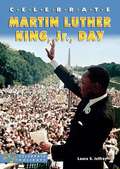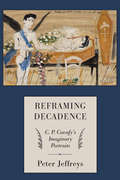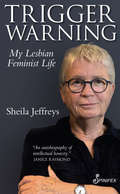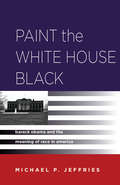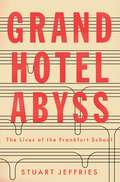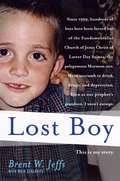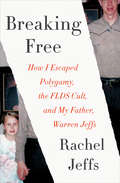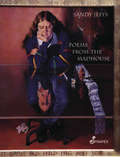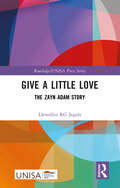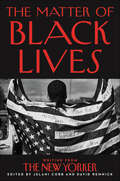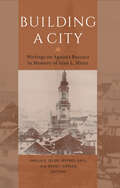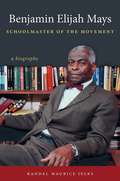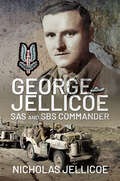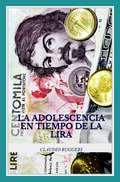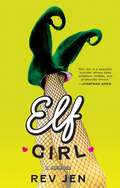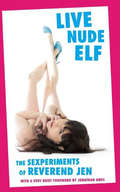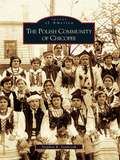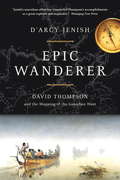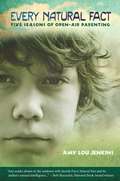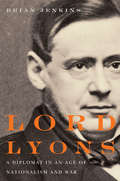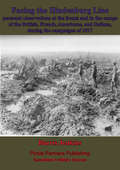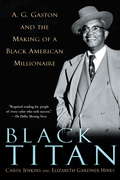- Table View
- List View
Celebrate Martin Luther King, Jr., Day (Celebrate Holidays)
by Laura S. JeffreyWhy do we celebrate Martin Luther King, Jr., Day? How do we celebrate it? How did this day become a holiday? Meet Martin Luther King, Jr.! This is an interesting book about Martin Luther King, Jr.'s special day. Other books in this series are available from Bookshare.
Reframing Decadence: C. P. Cavafy's Imaginary Portraits
by Peter JeffreysDuring his sojourn in England during the 1870s, a young Cavafy found himself enthralled by the aesthetic movement of cosmopolitan London. It was during these years that he encountered the canvases and personalities of Pre-Raphaelite painters, including Burne-Jones and Whistler, as well as works of aesthetic writers who were effecting a revolution in British literary culture and channeling influences from France that would gradually coalesce into an international decadent movement. In Reframing Decadence Peter Jeffreys returns us to this critical period of Cavafy's life, showing the poet's creative indebtedness to British and French avant-garde aesthetes whose collective impact on his poetry proved to be profound. In the process, Jeffreys offers a critical reappraisal of Cavafy’s relation to Victorian aestheticism and French literary decadence. Foremost among the tropes of decadence that captivated Cavafy were the decline of imperial Rome, the rise of Christianity, and the lingering twilight of Byzantium. The influence of Walter Pater on Cavafy’s view of classical and late-antique history was immense, inflected as it was with an unapologetic homoerotic aesthetic that Cavafy would adopt as his own, making Pater’s imaginary portraits an important touchstone for his own historicizing poetry. Cavafy would move beyond Pater to explore a more openly homoerotic sensuality but he never quite abandoned this rich Victorian legacy, one that contributed greatly to his emergence as a global poet. Jeffreys concludes by considering Cavafy’s current popularity as a gay poet and his curious relation to kitsch as manifest in his ongoing popularity via translation and visual media.
Trigger Warning: My Lesbian Feminist Life
by Sheila JeffreysI am in the very fortunate position of having been able to contribute to two waves of feminism: The Women's Liberation Movement and the new wave that is taking place now. Trigger Warning: My Lesbian Feminist Life is both an engaging autobiography and a fascinating account of feminist history. From the heady days of the Women's Liberation Movement through to the backlash against radical feminism as neoliberal laissez-faire attitudes took hold. Fast forward to the current re-examination of feminism in light of the #MeToo movement and an emerging new wave of radical feminism.Sheila Jeffreys' bold account makes it clear that the feminism and lesbianism she has championed for decades is needed more than ever. With honesty and frankness, she tells of victories and setbacks in her unrelenting commitment to women's freedom from men's violence, especially the violence inherent in pornography and prostitution. We also learn what her steadfastness has cost her in terms of personal and professional rewards.Trigger Warning places radical feminism within a cultural, social and intellectual context while also taking us on a personal journey. Sheila Jeffreys has tirelessly crossed the globe to advance radical feminist theory and practice and we are invited to share in the intellectual and political crossroads she has encountered during her life.Accessible yet detailed and rigorous, this landmark volume is essential reading for everyone who has ever wondered what radical feminism really is.
Paint the White House Black: Barack Obama and the Meaning of Race in America
by Michael P. JeffriesBarack Obama's election as the first black president in American history forced a reconsideration of racial reality and possibility. It also incited an outpouring of discussion and analysis of Obama's personal and political exploits. Paint the White House Blackfills a significant void in Obama-themed debate, shifting the emphasis from the details of Obama's political career to an understanding of how race works in America. In this groundbreaking book, race, rather than Obama, is the central focus. Michael P. Jeffries approaches Obama's election and administration as common cultural ground for thinking about race. He uncovers contemporary stereotypes and anxieties by examining historically rooted conceptions of race and nationhood, discourses of "biracialism" and Obama's mixed heritage, the purported emergence of a "post-racial society," and popular symbols of Michelle Obama as a modern black woman. In so doing, Jeffries casts new light on how we think about race and enables us to see how race, in turn, operates within our daily lives. Race is a difficult concept to grasp, with outbursts and silences that disguise its relationships with a host of other phenomena. Using Barack Obama as its point of departure,Paint the White House Blackboldly aims to understand race by tracing the web of interactions that bind it to other social and historical forces.
Grand Hotel Abyss: The Lives of the Frankfurt School
by Stuart JeffriesThis brilliant group biography asks who were the Frankfurt School and why they matter todayIn 1923, a group of young radical German thinkers and intellectuals came together to at Victoria Alle 7, Frankfurt, determined to explain the workings of the modern world. Among the most prominent members of what became the Frankfurt School were the philosophers Walter Benjamin, Theodor Adorno, Max Horkheimer, and Herbert Marcuse. Not only would they change the way we think, but also the subjects we deem worthy of intellectual investigation. Their lives, like their ideas, profoundly, sometimes tragically, reflected and shaped the shattering events of the twentieth century.Grand Hotel Abyss combines biography, philosophy, and storytelling to reveal how the Frankfurt thinkers gathered in hopes of understanding the politics of culture during the rise of fascism. Some of them, forced to escape the horrors of Nazi Germany, later found exile in the United States. Benjamin, with his last great work--the incomplete Arcades Project--in his suitcase, was arrested in Spain and committed suicide when threatened with deportation to Nazi-occupied France. On the other side of the Atlantic, Adorno failed in his bid to become a Hollywood screenwriter, denounced jazz, and even met Charlie Chaplin in Malibu.After the war, there was a resurgence of interest in the School. From the relative comfort of sun-drenched California, Herbert Marcuse wrote the classic One Dimensional Man, which influenced the 1960s counterculture and thinkers such as Angela Davis; while in a tragic coda, Adorno died from a heart attack following confrontations with student radicals in Berlin.By taking popular culture seriously as an object of study--whether it was film, music, ideas, or consumerism--the Frankfurt School elaborated upon the nature and crisis of our mass-produced, mechanised society. Grand Hotel Abyss shows how much these ideas still tell us about our age of social media and runaway consumption.From the Hardcover edition.
Lost Boy
by Brent W. Jeffs Maia SzalavitzStarred Review. In this moving debut memoir, the nephew of a Mormon sect leader chronicles life in the Fundamentalist Church of Jesus Christ of Latter Day Saints, and what came after. Among a 10,000-member Mormon community, Jeffs grew up with three mothers, more than a dozen siblings, and a deep fear of the world outside of the church. Within the secretive community, Jeffs was taught that purity came from special attention to dress, hard work, generosity and, most importantly, obedience to one's elders (especially his uncle, the prophet Warren Jeffs). The focus of this fast-paced memoir is the sexual abuse Jeffs and his brothers endured at the hands of their relatives during church and school functions, for which he would file a class-action lawsuit in 2004. Jeffs's descent into depression proves the beginning of the end for his relationship with the church and, consequently, with much of his family. Jeffs outlines the core beliefs of the Church, along with the oppressive ends to which they were used, and the heartbreaking fate of those church members expelled into a society they were raised to see as evil and corrupt. This hard-to-put-down, tightly woven account pulls back the curtain on what's become a perennial news story, while illustrating the impiety of absolute power and the delicacy of innocence. Copyright Reed Business Information, a division of Reed Elsevier Inc. All rights reserved.
Breaking Free: How I Escaped Polygamy, the FLDS Cult, and My Father, Warren Jeffs
by Rachel JeffsIn this searing memoir of survival in the spirit of Stolen Innocence, the daughter of Warren Jeffs, the self-proclaimed Prophet of the FLDS Church, takes you deep inside the secretive polygamist Mormon fundamentalist cult run by her family and how she escaped it.Born into the Fundamentalist Church of Jesus Christ of Latter-Day Saints, Rachel Jeffs was raised in a strict patriarchal culture defined by subordinate sister wives and men they must obey. No one in this radical splinter sect of the Mormon Church was more powerful or terrifying than its leader Warren Jeffs—Rachel’s father.Living outside mainstream Mormonism and federal law, Jeffs arranged marriages between under-age girls and middle-aged and elderly members of his congregation. In 2006, he gained international notoriety when the FBI placed him on its Ten Most Wanted List. Though he is serving a life sentence for child sexual assault, Jeffs’ iron grip on the church remains firm, and his edicts to his followers increasingly restrictive and bizarre.In Breaking Free, Rachel blows the lid off this taciturn community made famous by John Krakauer’s bestselling Under the Banner of Heaven to offer a harrowing look at her life with Warren Jeffs, and the years of physical and emotional abuse she suffered. Sexually assaulted, compelled into an arranged polygamous marriage, locked away in "houses of hiding" as punishment for perceived transgressions, and physically separated from her children, Rachel, Jeffs’ first plural daughter by his second of more than fifty wives, eventually found the courage to leave the church in 2015. But Breaking Free is not only her story—Rachel’s experiences illuminate those of her family and the countless others who remain trapped in the strange world she left behind.A shocking and mesmerizing memoir of faith, abuse, courage, and freedom, Breaking Free is an expose of religious extremism and a beacon of hope for anyone trying to overcome personal obstacles.
Poems From the Madhouse
by Sandy JeffsA powerful collection of poetry about schizophrenia, with an introduction for young people, discussing the causes/effects .
Give a Little Love: The Zayn Adam Story (Routledge/UNISA Press Series)
by Llewellin RG JegelsThis is the true story of a standout artist in the field of pop and sentimental song; a star entertainer who rose to fame in Cape Town, South Africa. The world reflected in this book has several genealogical strands reaching back to other histories – to the nineteenth century theatre, to the rise of racism in South Africa, and the ways people were forced to negotiate the contradictions of being human against impossible odds. We encounter a biographer with a subject which is close to him, and which he has meticulously researched over a course of time. The book offers insights into the musical world of the phonograph, of the global popular culture after the Second World War and how this was absorbed into Cape Town’s popular culture.
The Matter of Black Lives: Writing from The New Yorker
by Jelani Cobb and David RemnickA collection of The New Yorker‘s groundbreaking writing on race in America—including work by James Baldwin, Toni Morrison, Ta-Nehisi Coates, Hilton Als, Zadie Smith, and more—with a foreword by Jelani CobbThis anthology from the pages of the New Yorker provides a bold and complex portrait of Black life in America, told through stories of private triumphs and national tragedies, political vision and artistic inspiration. It reaches back across a century, with Rebecca West’s classic account of a 1947 lynching trial and James Baldwin’s “Letter from a Region in My Mind” (which later formed the basis of The Fire Next Time), and yet it also explores our current moment, from the classroom to the prison cell and the upheavals of what Jelani Cobb calls “the American Spring.” Bringing together reporting, profiles, memoir, and criticism from writers such as Chimamanda Ngozi Adichie, Elizabeth Alexander, Hilton Als, Vinson Cunningham, Henry Louis Gates, Jr., Malcolm Gladwell, Jamaica Kincaid, Kelefa Sanneh, Doreen St. Félix, and others, the collection offers startling insights about this country’s relationship with race. The Matter of Black Lives reveals the weight of a singular history, and challenges us to envision the future anew.
Building a City: Writings on Agnon's Buczacz in Memory of Alan Mintz
by Sheila E. Jelen Jeffrey Saks Wendy ZierlerThe fiction of Nobel Laureate Shmuel Yosef Agnon is the foundation of the array of scholarly essays as seen through the career of Alan Mintz, visionary scholar and professor of Jewish literature at the Jewish Theological Seminary of America. Mintz introduced Agnon's posthumously published Ir Umeloah (A City in Its Fullness)—a series of linked stories set in the 17th century and focused on Agnon's hometown, Buczacz, a town in what is currently western Ukraine—to an English reading audience, and argued that Agnon's unique treatment of Buczacz in A City in its Fullness, navigating the sometimes tenuous boundary of the modernist and the mythical, was a full-throated, self-conscious literary response to the Holocaust. This volume is an extension of a memorial dedicated to Mintz's memory (who died suddenly in 2017) which combines selections of Alan's work from the beginning, middle and end of his career, with autobiographical tributes from older and younger scholars alike. The essays dealing with Agnon and Buczacz remember the career of Alan Mintz and his contribution to the world of Jewish studies and within the world of Jewish communal life.
Benjamin Elijah Mays, Schoolmaster of the Movement
by Randal Maurice JelksIn this first full-length biography of Benjamin Mays (1894-1984), Randal Maurice Jelks chronicles the life of the man Martin Luther King Jr. called his "spiritual and intellectual father." Dean of the Howard University School of Religion, president of Morehouse College, and mentor to influential black leaders, Mays had a profound impact on the education of the leadership of the black church and of a generation of activists, policymakers, and educators. Jelks argues that Mays's ability to connect the message of Christianity with the responsibility to challenge injustice prepared the black church for its pivotal role in the civil rights movement. From Mays's humble origins in Epworth, South Carolina, through his doctoral education, his work with institutions such as the National Urban League, the NAACP, and the national YMCA movement, and his significant career in academia, Jelks creates a rich portrait of the man, the teacher, and the scholar. Benjamin Elijah Mays, Schoolmaster of the Movement is a powerful portrayal of one man's faith, thought, and mentorship in bringing American apartheid to an end.
George Jellicoe: SAS and SBS Commander
by Nicholas C. JellicoeGeorge Jellicoe, son of Admiral Sir John Jellicoe, commander of the British Grand Fleet at Jutland, was never compromised by his privileged upbringing. In this insightful biography, his son describes a life of action, drama, public service and controversy. George’s exploits with the newly formed SAS, as David Stirling’s second-in-command, and later commanding the SBS, make for fascinating reading. Over four years it embraced the North African and Mediterranean campaigns and culminated in the saving of a newly-liberated Athens from the communist guerrillas of ELAS. The brutality of Stalinist communism led him to join the post-war Foreign Office. In Washington he worked with Kim Philby and Donald Maclean in the cloak and dagger world of espionage. Resigning in 1958 so he could marry the woman he loved, he turned to politics. Although his ministerial career ended in 1973 after unwittingly become entangled with the Lambton scandal, he continued to sit in the House of Lords becoming ‘Father of the House’. He held numerous public appointments including President of the Royal Geographical Society, Chairman of the Medical Research Council, President of the SAS Regimental Association and the UK Crete Veterans Association. Thanks to the author’s research and access, this is more than a biography of a significant public figure. It provides fascinating detail of Special Forces operations and the characters of the countless figures with whom he mixed.
La adolescencia en tiempo de la lira
by Jelmer Alexander de Kok Bernat Claudio RuggeriEl encuentro de dos amigos una tarde de verano, en el cual el más jóven escuchará las anécdotas del otro de un mundo ya desaparecido y que no volverá a existir, en el que se escuchaba mucho la frase "No tengo una lira".
Elf Girl
by Rev JenMeet Rev Jen, patron saint of the uncool, cheerleader for nonconformists, geeks, and oddballs the world over. From her tiny rent-controlled apartment on Manhattan's hip Lower East Side, she holds court over a wacky cast of friends and lovers with an unchecked candor that makes her impossible not to love. Zany and wry, Rev Jen will charm readers with these fun and irreverent true stories of her meteoric rise from art school misfit to neighborhood celebrity and all-around good-time gal. Whether she is dressing up as Doo-Doo, the hard-drinking Teletubby who's been expelled from Teletubbyland, or starring in her one-woman musical Rats, the shortest running show on Broadway, Jen's quirky humor and genuine heart make Elf Girl an anthem for misfits everywhere. f, which received a starred review from Publishers Weekly and was hailed as a must-read by Bust magazine, The Village Voice, Bookslut.com, and many more, Elf Girl is infused with Jen's zany sense of humor and a surprising amount of heart. Featuring an Introduction by Bored to Death creator Jonathan Ames, who even based a character on Rev Jen (elf ears and all!) in the HBO hit show's second season, this is an anthem for dorky girls everywhere--a sharply observant and entertaining memoir.
Live Nude Elf: The Sexperiments of Reverend Jen
by Reverend JenLive Nude Elf: The Sexperiments of Reverend Jen chronicles Reverend Jen Miller's two-year series of adventures in love and sex in New York City The Reverend is a sort of elvish-speaking, Lower East Side version of Sex and the City's Carrie Bradshaw. The "sexperiments" range from harrowing (working as a live nude girl at Wiggles) to embarrassing (attending fellatio school) to transcendent (reaching a mystical state through tantric sex). Along the way there is transvestitism, female ejaculation, opium smoking, and heartbreak.In the Rev's "art star" world, where a twenty-one-year-old bisexual boy named Orion has sex with a jar of Mayonnaise, the more "mundane" acts of courtship, romance, and sex-kissing only, buying dinner for a lover, or just making eye contact in the sack-become themselves rare and subversive.After a year, Jen confesses to having "grown a little tired of having sex." The experimentation, the many "lab partners," the late nights and cans of Budweiser, "meant romance was hard to come by." After a decade of New York City flings, affairs, and a few failed relationships, Jen unexpectedly falls in love, and finally must decide between him and her art: can she continue a sex column and have a functional monogamous relationship? Or does the life implicit of a sex columnist preclude her from monogamous romantic love?
Polish Community of Chicopee, The
by Stephen R. JendrysikThe first group of Polish immigrants to come to Chicopee arrived in 1880. These Poles filled many of the manufacturing jobs in the city's two large textile mills. In less than 30 years from their arrival, this aggressive, self-assured group boasted more Polish-owned businesses than any other community in New England. The Polish Community of Chicopee chronicles an immigrant population that was fiercely dedicated to the ideals of free enterprise and democratic pluralism.
Epic Wanderer
by D'Arcy JenishPopular historian D'Arcy Jenish recreates the adventure and sacrifice of mapmaker David Thompson's fascinating life in the wilderness of North America.Epic Wanderer, the first full-length biography of David Thompson, is set in the late eighteenth and early nineteenth centuries against a broad canvas of dramatic rivalries -- between the United States and British North America, between the Hudson's Bay Company and its Montreal-based rival, the North West Co., and between the various First Nations thrown into disarray by the advent of guns, horses and alcohol.Less celebrated than his contemporaries Lewis and Clark, Thompson spent nearly three decades (1784-1812) surveying and mapping over 1.2 million square miles of largely uncharted Indian territory. Travelling across the prairies, over the Rockies and on to the Pacific, Thompson transformed the raw data of his explorations into a map of the Canadian West. Measuring ten feet by seven feet, and laid out with astonishing accuracy, the map became essential to the politicians and diplomats who would decide upon the future of the rich and promising lands of the West. Yet its creator worked without personal glory and died in penniless obscurity.Drawing extensively on David Thompson's personal journals, illustrated with his detailed sketches, intricate notebook pages and the map itself, Epic Wanderer charts the life of a man who risked everything in the name of scientific advancement and exploration.From the Hardcover edition.
Every Natural Fact
by Amy Lou JenkinsEvery Natural Fact: Five Seasons of Open-Air Parenting is a narrative of mother-and-son nature outings across the state of Wisconsin. In a style that blends the voices of Janisse Ray and Annie Dillard, a mother and son explore parallels in the world of people and nature. The interconnected chapters stand on their own and build upon each other. These explorations of natural history, flora and fauna, and parenting themes demonstrate that the mythic thread that winds through everything can still be found, even in a world of wounds. Amy Lou Jenkins' award-winning writing is rich in sensory immediacy, characterization, natural history, and humor.
Lord Lyons
by Brian JenkinsThe British ambassador in Washington during the US Civil War and ambassador in Paris before and after the Franco-Prussian war, Lord Lyons (1817-1887) was one of the most important diplomats of the Victorian period. Although frequently featured in histories of the United States and Europe in the second half of the nineteenth century, and in discussions and analyses of British foreign policy, he has remained an ill-defined figure. In Lord Lyons: A Diplomat in an Age of Nationalism and War, Brian Jenkins explains the man and examines his career. Based on a staggering study of primary sources, he presents a convincing portrait of a subject who rarely revealed himself personally. Though he avoided publicity, Lyons came to be regarded as his nation's premier diplomat as his career took him to the heart of the great international issues and crises of his generation. As minister to the United States he played a vital role in preserving Anglo-American peace and was a powerful voice opposing Anglo-French intervention in the Civil War. While ambassador to the Ottoman Empire, he helped to prevent French control of the Suez Canal then under construction. In France, he maintained an amiable and constructive relationship with a bitter nation struggling to reorganize itself and its constitution after the Franco-Prussian War. For many historians Lord Lyons has been difficult to ignore but hard to admire. In rescuing him as a truly important historical figure, Jenkins details for the first time the personal and public strategies Lyons employed through decades of exemplary diplomatic service on both sides of the Atlantic.
Lord Lyons: A Diplomat in an Age of Nationalism and War
by Brian JenkinsThe British ambassador in Washington during the US Civil War and ambassador in Paris before and after the Franco-Prussian war, Lord Lyons (1817-1887) was one of the most important diplomats of the Victorian period. Although frequently featured in histories of the United States and Europe in the second half of the nineteenth century, and in discussions and analyses of British foreign policy, he has remained an ill-defined figure. In Lord Lyons: A Diplomat in an Age of Nationalism and War, Brian Jenkins explains the man and examines his career. Based on a staggering study of primary sources, he presents a convincing portrait of a subject who rarely revealed himself personally. Though he avoided publicity, Lyons came to be regarded as his nation's premier diplomat as his career took him to the heart of the great international issues and crises of his generation. As minister to the United States he played a vital role in preserving Anglo-American peace and was a powerful voice opposing Anglo-French intervention in the Civil War. While ambassador to the Ottoman Empire, he helped to prevent French control of the Suez Canal then under construction. In France, he maintained an amiable and constructive relationship with a bitter nation struggling to reorganize itself and its constitution after the Franco-Prussian War. For many historians Lord Lyons has been difficult to ignore but hard to admire. In rescuing him as a truly important historical figure, Jenkins details for the first time the personal and public strategies Lyons employed through decades of exemplary diplomatic service on both sides of the Atlantic.
Facing The Hindenburg Line; Personal Observations At The Fronts: and in the camps of the British, French, Americans, and Italians, during the campaigns of 1917
by Burris JenkinsBurris A. Jenkins served in the double capacity of a war correspondent and a lecturer in the Y.M.C.A, he was sent to the European War in 1916/17. He travelled through many of the camps and rear-zones of the First World War, noting down anecdotes and sketches of the soldiers that he met; from the dashing French Chasseurs, to the stolid but humorous Tommies. He wrote of his experiences among the soldiers and the sights of the warzones on his return to the United States, part of the campaign to publicize the Allies sacrifices and gain support for the American entry into the War. Author -- Jenkins, Burris A., 1869-1945.Text taken, whole and complete, from the edition published in New York, F.H. Revell Co., 1917Original Page Count - 256 pages
Black Titan: A.G. Gaston and the Making of a Black American Millionaire
by Carol Jenkins Elizabeth Gardner HinesThe grandson of slaves, born into poverty in 1892 in the Deep South, A. G. Gaston died more than a century later with a fortune worth well over $130 million and a business empire spanning communications, real estate, and insurance. Gaston was, by any measure, a heroic figure whose wealth and influence bore comparison to J. P. Morgan and Andrew Carnegie. Here, for the first time, is the story of the life of this extraordinary pioneer, told by his niece and grandniece, the award-winning television journalist Carol Jenkins and her daughter Elizabeth Gardner Hines.Born at a time when the bitter legacy of slavery and Reconstruction still poisoned the lives of black Americans, Gaston was determined to make a difference for himself and his people. His first job, after serving in the celebrated all-black regiment during World War I, bound him to the near-slavery of an Alabama coal mine--but even here Gaston saw not only hope but opportunity. He launched a business selling lunches to fellow miners, soon established a rudimentary bank--and from then on there was no stopping him. A kind of black Horatio Alger, Gaston let a single, powerful question be his guide: What do our people need now? His success flowed from an uncanny genius for knowing the answer. Combining rich family lore with a deep knowledge of American social and economic history, Carol Jenkins and Elizabeth Hines unfold Gaston's success story against the backdrop of a century of crushing racial hatred and bigotry. Gaston not only survived the hardships of being black during the Depression, he flourished, and by the 1950s he was ruling a Birmingham-based business empire. When the movement for civil rights swept through the South in the late 1950s and early 1960s, Gaston provided critical financial support to many activists.At the time of his death in 1996, A. G. Gaston was one of the wealthiest black men in America, if not the wealthiest. But his legacy extended far beyond the monetary. He was a man who had proved it was possible to overcome staggering odds and make a place for himself as a leader, a captain of industry, and a far-sighted philanthropist. Writing with grace and power, Jenkins and Hines bring their distinguished ancestor fully to life in the pages of this book. Black Titan is the story of a man who created his own future--and in the process, blazed a future for all black businesspeople in America.From the Hardcover edition.
Black Titan: A.G. Gaston and the Making of a Black American Millionaire
by Carol Jenkins Elizabeth Gardner HinesThe grandson of slaves, born into poverty in 1892 in the Deep South, A. G. Gaston died more than a century later with a fortune worth well over $130 million and a business empire spanning communications, real estate, and insurance. Gaston was, by any measure, a heroic figure whose wealth and influence bore comparison to J. P. Morgan and Andrew Carnegie. Here, for the first time, is the story of the life of this extraordinary pioneer, told by his niece and grandniece, the award-winning television journalist Carol Jenkins and her daughter Elizabeth Gardner Hines.Born at a time when the bitter legacy of slavery and Reconstruction still poisoned the lives of black Americans, Gaston was determined to make a difference for himself and his people. His first job, after serving in the celebrated all-black regiment during World War I, bound him to the near-slavery of an Alabama coal mine--but even here Gaston saw not only hope but opportunity. He launched a business selling lunches to fellow miners, soon established a rudimentary bank--and from then on there was no stopping him. A kind of black Horatio Alger, Gaston let a single, powerful question be his guide: What do our people need now? His success flowed from an uncanny genius for knowing the answer. Combining rich family lore with a deep knowledge of American social and economic history, Carol Jenkins and Elizabeth Hines unfold Gaston's success story against the backdrop of a century of crushing racial hatred and bigotry. Gaston not only survived the hardships of being black during the Depression, he flourished, and by the 1950s he was ruling a Birmingham-based business empire. When the movement for civil rights swept through the South in the late 1950s and early 1960s, Gaston provided critical financial support to many activists.At the time of his death in 1996, A. G. Gaston was one of the wealthiest black men in America, if not the wealthiest. But his legacy extended far beyond the monetary. He was a man who had proved it was possible to overcome staggering odds and make a place for himself as a leader, a captain of industry, and a far-sighted philanthropist. Writing with grace and power, Jenkins and Hines bring their distinguished ancestor fully to life in the pages of this book. Black Titan is the story of a man who created his own future--and in the process, blazed a future for all black businesspeople in America.From the Hardcover edition.
Black Titan: A. G. Gaston and the Making of a Black American Millionaire
by Carol Jenkins Elizabeth Gardner HinesThe grandson of slaves, born into poverty in 1892 in the Deep South, A. G. Gaston died more than a century later with a fortune worth well over $130 million and a business empire spanning communications, real estate, and insurance. Gaston was, by any measure, a heroic figure whose wealth and influence bore comparison to J. P. Morgan and Andrew Carnegie. Here, for the first time, is the story of the life of this extraordinary pioneer, told by his niece and grandniece, the award-winning television journalist Carol Jenkins and her daughter Elizabeth Gardner Hines. Born at a time when the bitter legacy of slavery and Reconstruction still poisoned the lives of black Americans, Gaston was determined to make a difference for himself and his people. His first job, after serving in the celebrated all-black regiment during World War I, bound him to the near-slavery of an Alabama coal mine—but even here Gaston saw not only hope but opportunity. He launched a business selling lunches to fellow miners, soon established a rudimentary bank—and from then on there was no stopping him. A kind of black Horatio Alger, Gaston let a single, powerful question be his guide:What do our people need now?His success flowed from an uncanny genius for knowing the answer. Combining rich family lore with a deep knowledge of American social and economic history, Carol Jenkins and Elizabeth Hines unfold Gaston’s success story against the backdrop of a century of crushing racial hatred and bigotry. Gaston not only survived the hardships of being black during the Depression, he flourished, and by the 1950s he was ruling a Birmingham-based business empire. When the movement for civil rights swept through the South in the late 1950s and early 1960s, Gaston provided critical financial support to many activists. At the time of his death in 1996, A. G. Gaston was one of the wealthiest black men in America, if notthewealthiest. But his legacy extended far beyond the monetary. He was a man who had proved it was possible to overcome staggering odds and make a place for himself as a leader, a captain of industry, and a far-sighted philanthropist. Writing with grace and power, Jenkins and Hines bring their distinguished ancestor fully to life in the pages of this book. Black Titanis the story of a man who created his own future—and in the process, blazed a future for all black businesspeople in America.
